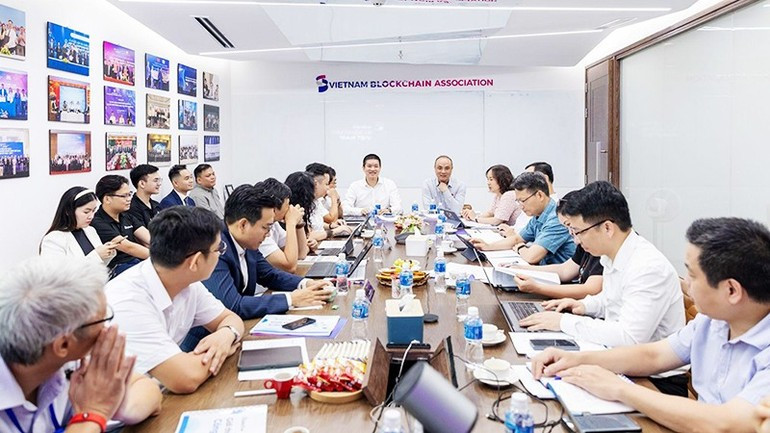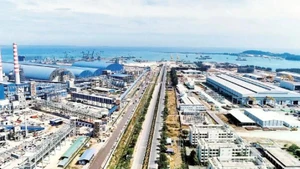According to statistics from the electronic payment gateway Triple-A – a cryptocurrency payment platform licensed by the Monetary Authority of Singapore – about 21.2% of Viet Nam’s population, equating to tens of millions of people, currently hold digital currencies, placing the country among the global leaders in ownership rates.
First official legal document
The Government has promulgated Resolution 05, piloting a digital asset market for five years. This is the first official document to establish a legal framework for this fast-growing but still novel class of assets.
Commenting on this policy, lawyer Truong Thanh Duc, CEO of ANVI Law, noted that after many years in which Viet Nam had no regulations or legal foundation to govern the trading, issuance or purchase of digital assets (formerly known as “virtual currencies”), a legal system has now been established, spanning Party resolutions, National Assembly resolutions, and now a Government resolution.
“This is a significant step forward, as it formally acknowledges digital asset transactions as legal, allowing businesses to issue them and enabling citizens and investors to participate. It reflects a new perspective that embraces and legalises this type of asset.”
Agreeing with this view, Associate Professor Dr Dang Ngoc Duc, Director of the Institute of Financial Technology at Dai Nam University, said Viet Nam has around 200 fintech companies, with major players such as MoMo, Viettel Pay and VNPay. However, some areas, such as peer-to-peer lending, remain restricted. Hence, a stable legal environment is essential to manage large capital flows and wide participation, while protecting investors and ensuring economic stability.
Furthermore, with countries like Japan, Singapore, the United Arab Emirates and Thailand already moving ahead in shaping legal frameworks, Viet Nam cannot afford to lag behind. Digital assets are not only an inevitable trend but also a tool to advance the digital economy, integrate with the global financial system and attract foreign investment.
With this new resolution, digital assets have, for the first time, been moved out of the legal “grey zone” into the realm of State oversight, albeit on a pilot basis. This will build confidence for businesses, fintech firms and start-ups to grow securely, while safeguarding the interests of the more than 10 million participants engaged in transactions worth hundreds of billions of US dollars.
“Digital assets and tokenisation also promise to become a channel for international capital mobilisation, diversifying funding sources beyond gold or real estate, thereby establishing a transparent market and strengthening investor confidence both domestically and abroad,” Dr Duc stressed.

Nonetheless, the expert also underlined that the greatest challenge lies in striking a balance between strict regulation to mitigate risks and encouraging innovation. This requires close control through rules on minimum charter capital, licensing, and restricting transactions to the Vietnamese dong (VND) to ensure effective State oversight.
At the same time, technological safety must be guaranteed through Level 4 security standards to protect systems and data. Innovation is encouraged by allowing product and service testing within a limited scope under supervision and evaluation before scaling up. After the five-year pilot, Viet Nam will have sufficient data to assess and formally implement relevant policies.
According to lawyer Truong Thanh Duc, while trading of digital assets previously took place informally both inside and outside the country, within six months of the resolution taking effect, all transactions will only be permitted on a single licensed digital asset exchange. For investors, registration, opening an official account, and trading lawfully will be compulsory, replacing the unregulated participation of the past.
Issuing companies must also meet very strict conditions, particularly the requirement to base issuance on real underlying assets. This is the first time such a regulation has been imposed, so clear guidance will be needed on what constitutes “real assets”, along with standards and conditions, to ensure both licensing authorities and enterprises act consistently. Most importantly, businesses must prepare the necessary legal and technical foundations, particularly the asset base, before they can qualify to issue and trade officially on the licensed exchange.
Therefore, competent authorities need to promptly release guidelines – from legal provisions to administrative procedures – so that enterprises know what to prepare, how to apply, and how to secure approval. Only then, once the exchange is officially launched, can operations run safely, minimising risks for investors, businesses and the market alike.
Taxation is another critical issue. In the past, due to unregulated, unrecognised transactions, virtually no tax was collected and no declarations were made. Under the new regulations, operating exchanges and issuing firms will be taxed like any other business. For investors, taxation may follow a model similar to securities.
Trial and adjustment
Addressing these challenges, Phan Duc Trung, Chairman of the Viet Nam Blockchain and Digital Asset Association, noted that any country introducing an initial legal framework would face difficulties.
However, during the five-year pilot, Resolution 05 does not aim to cover everything, but rather to establish a basic framework with phased adjustments. This will ensure the market launches on a safe, transparent and tightly controlled footing. On technology, participants must meet at least Level 4 security standards – a very high requirement – to ensure safety. On governance, companies must have senior personnel such as a Chief Technology Officer and a Chief Compliance Officer, and hold professional licences related to securities and finance. In terms of capital, at least 65% of founding shareholders in the initial phase must be institutions active in banking, securities or fintech.
The association will work with ministries, sectors, businesses and the community to contribute feedback, set technological standards, train human resources and support governance. This represents an opportunity for Viet Nam to both trial and adjust.
“More importantly, we aim to help the Government swiftly finalise subsequent legal frameworks – from resolutions and decrees to circulars – so that the digital asset market in Viet Nam can develop transparently, safely and in line with international integration.”
Resolution 05 not only marks the beginning of building an official digital asset market in Viet Nam, but also serves as a test in balancing tight regulation with the encouragement of innovation. After the five-year pilot, Viet Nam will have the data needed to shape its own law on digital assets, turning the market into a transparent funding channel that contributes to digital economic growth and global integration.
Phan Duc Trung, Chairman of the Viet Nam Blockchain and Digital Asset Association: Perfecting technology and ensuring compatibility with international standards remain major challenges. There are currently more than 800 global exchanges.
















